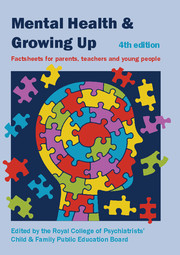Book contents
- Frontmatter
- Contents
- Contributors
- Factsheets for young people
- Factsheets for parents, carers and anyone who works with young people
- 1 Good parenting
- 2 The restless and excitable child
- 3 Dealing with tantrums
- 4 Children who soil or wet themselves
- 5 Sleep problems in childhood and adolescence
- 6 Behavioural problems and conduct disorder
- 7 Attention-deficit hyperactivity disorder (ADHD)
- 8 The child with general learning disability
- 9 Specific learning difficulties
- 10 Autism and Asperger syndrome
- 11 Depression in children
- 12 Worries and anxieties: helping children to cope
- 13 Divorce or separation of parents: the impact on children and adolescents
- 14 Death in the family: helping children to cope
- 15 The emotional cost of bullying
- 16 Traumatic stress in children
- 17 Domestic violence: its effects on children
- 18 Child abuse and neglect: the emotional effect
- 19 Drugs and alcohol: what parents need to know
- 20 Self-harm in young people
- 21 Psychosis
- 22 Schizophrenia
- 23 Bipolar disorder in children and adolescents
- 24 Obsessive–compulsive disorder in children and young people
- 25 Eating disorders in young people
- 26 Chronic physical illness: the effects on mental health
- 27 Medically unexplained physical symptoms
- 28 Chronic fatigue syndrome: helping your child get better
- 29 Parental mental illness: the problems for children
- 30 Who's who in CAMHS
29 - Parental mental illness: the problems for children
from Factsheets for parents, carers and anyone who works with young people
Published online by Cambridge University Press: 02 January 2018
- Frontmatter
- Contents
- Contributors
- Factsheets for young people
- Factsheets for parents, carers and anyone who works with young people
- 1 Good parenting
- 2 The restless and excitable child
- 3 Dealing with tantrums
- 4 Children who soil or wet themselves
- 5 Sleep problems in childhood and adolescence
- 6 Behavioural problems and conduct disorder
- 7 Attention-deficit hyperactivity disorder (ADHD)
- 8 The child with general learning disability
- 9 Specific learning difficulties
- 10 Autism and Asperger syndrome
- 11 Depression in children
- 12 Worries and anxieties: helping children to cope
- 13 Divorce or separation of parents: the impact on children and adolescents
- 14 Death in the family: helping children to cope
- 15 The emotional cost of bullying
- 16 Traumatic stress in children
- 17 Domestic violence: its effects on children
- 18 Child abuse and neglect: the emotional effect
- 19 Drugs and alcohol: what parents need to know
- 20 Self-harm in young people
- 21 Psychosis
- 22 Schizophrenia
- 23 Bipolar disorder in children and adolescents
- 24 Obsessive–compulsive disorder in children and young people
- 25 Eating disorders in young people
- 26 Chronic physical illness: the effects on mental health
- 27 Medically unexplained physical symptoms
- 28 Chronic fatigue syndrome: helping your child get better
- 29 Parental mental illness: the problems for children
- 30 Who's who in CAMHS
Summary
How many children have a parent with mental illness?
Many children will grow up with a parent who, at some point, will have some degree of mental illness. Most of these parents will have mild or short-lived illnesses, and will usually be treated by their GP.
A few children live with a parent who has a severe mental illness such as schizophrenia or bipolar disorder. In fact, 68% of women and 57% of men with a mental illness are parents. In addition, many children live with a parent who has long-term mental health problems, as well as alcohol or drug problems and personality disorders.
Why do children living with a parent with mental illness have difficulties?
Children can often cope well with all sorts of life upsets, especially if:
• the problem is short lived and does not keep repeating
• they can understand what is happening and, as much as possible, understand why it is happening.
Parents cannot control the fact that some illnesses, especially mental illnesses, can last a long time and may come back. Some parents may try to protect their children from their illness by keeping it a secret or treating it as something which cannot be asked about or explained. Although this is often done for good reasons, it is a mistake and can make it more difficult for the children to cope with or manage their own feelings. Such a situation may create a number of problems for children.
• They may develop the same illness. Although for some conditions the risk of having a similar illness can be higher within families, this can be reduced if the child is helped to see that they are not part of the illness, and they are able to have a good relationship with their parents, peers or any other adults who can be trusted and help them. Understanding the illness helps the child to achieve this.
• They may worry that they are to blame for their parent's illness and they may feel depressed.
- Type
- Chapter
- Information
- Mental Health and Growing UpFactsheets for Parents, Teachers and Young People, pp. 134 - 136Publisher: Royal College of PsychiatristsPrint publication year: 2013



